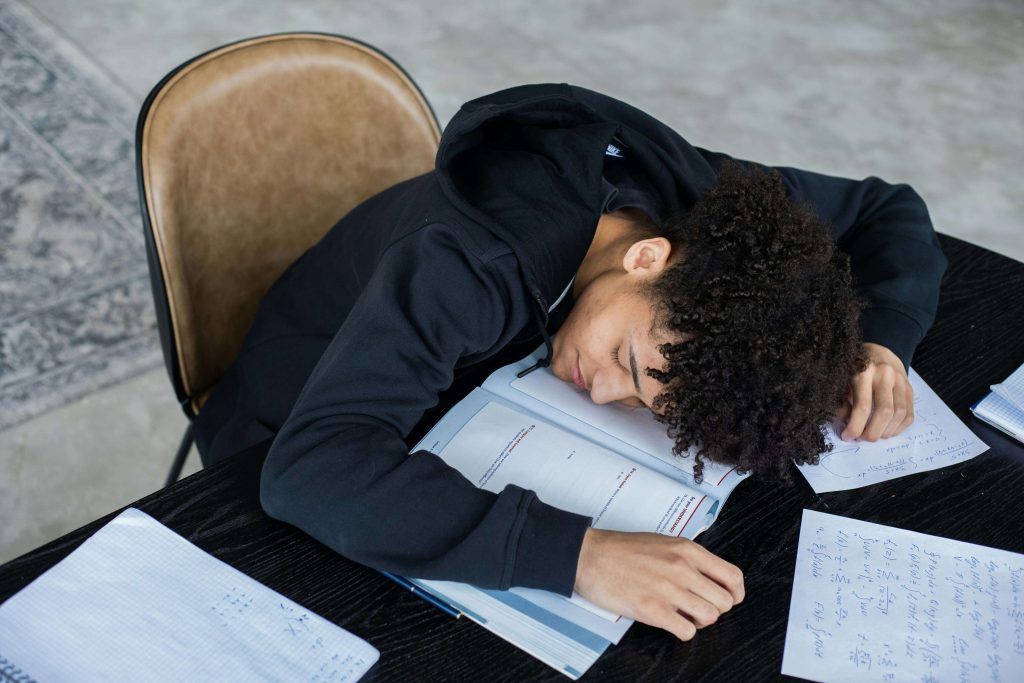How to Deal With Test Anxiety: 10 Proven Ways
reviewed by Jo-ann Caballes
Updated on September 9, 2024
It’s natural to want the best for your child, including stress-free youth. But test anxiety still sneaks up even to the smartest kids on the block. It’s a complex neuro issue that impacts concentration and self-esteem. Use tips from this article to teach your child how to cope with test anxiety.
What is test anxiety?
Test anxiety is a performance stress that happens during important exams. Adults may feel it during driving tests or advanced training. Kids may feel it during any test that seems vital to them.
This state of mind interferes with the ability to perform, lowering student’s efficiency. Thus, it’s crucial to understand tips for managing test anxiety. They can help you to lower the stress and successfully pass a test.
Causes of Test Anxiety
According to Niloufar Esmaeilpour, Founder and Clinical Counselor at Lotus Therapy & Counseling Centre, the most common test anxiety causes are
- High expectations,
- Fear of failing,
- Not preparing well.
- Perfectionism and catastrophization tendencies.
- Negative past experiences
- Extreme pressure from parents, teachers, or themselves.
- Cognitive factors include self-doubt, negative self-talk, and lack of time management.
“A general strategy for reducing test anxiety is to have a consistent study routine that is started far in advance of test dates.”
Relaxation techniques are other cool ways to help with test anxiety. Mindfulness tricks help students to quiet their minds and bodies, thus making it easier to concentrate on the test.
Test Anxiety Symptoms
- Increased heart rate
- Sweating
- Dry mouth
- Nausea
- Upset stomach
- Headaches
- Shaking
- Fear
- Panic
- Overwhelm
- Feeling unprepared
- Difficulty concentrating
- Mind going blank
During test anxiety, students often catastrophize, imagining worst-case scenarios in their heads. That’s why they may have racing thoughts and all-or-nothing thinking. It leads to difficulties remembering information and lower grades, which strengthens math test anxiety. Worrying about a test does not help when dealing with test anxiety.
What is the best way to combat test anxiety?
The best way to combat test anxiety is to prepare ahead. Ensure your child has consistent and focused study sessions a few weeks before the exam so they will actually memorize the material in their long-term memory. Also, Brighterly tutors can help your kid cope with test anxiety.
Overcome test anxiety with Brighterly
Brighterly tutors can help your child overcome test anxiety since we are here to build confidence and seal students’ knowledge gaps. Our tutors provide one-on-one attention and create a personalized syllabus to ensure that a child is confident in their math abilities.
They will teach your kid different time management and mindfulness techniques to handle test anxiety. Brighterly tutors also show your child different exam-taking strategies and coping mechanisms to lower stress. We will help your kid develop a growth mindset, focusing on constant progress.
10 tips on how to overcome test anxiety
- Develop consistent and diverse study habits
- Figure out a realistic time management strategy
- Take some mindfulness or meditation practices
- Adapt positive self-talk
- Practice tests to familiarize your kid with common test formats
- Get a good night’s sleep before the test
- Eat a nutritious breakfast
- Keep expectations realistic
- Tell your kid that everyone has their own pace
- Teach your child to ignore distractions
Develop consistent and diverse study habits
Consistent and diverse study habits are essential to decrease test anxiety. To develop a strong habit, you must ensure that your kid has a consistent routine with math studies as an integral part. Here is how you can help your kid handle test anxiety:
- Perform math lessons at the same place and time, if possible. Those who live on the road should have a special “study cave” in their RV.
- Set realistic goals by breaking down large tasks.
- Celebrate small milestones to maintain motivation.
Review materials at increasing intervals to improve the child’s retention and lower test-taking anxiety. Initially, you can repeat the exercise every lesson, and after a month, recall it every 2-3 lessons to ensure that a kid solidifies their knowledge.
Figure out a realistic time management strategy
Ensure that your curriculum is realistic and productive at the same time. Effective time management is about balance, flexibility, and personal adaptation. Before diving into the detailed topic exploration, determine the most crucial knowledge gaps to fill and start with. Use one of the common time management techniques:
- Pomodoro, where you work in focused long intervals with short breaks.
- Time blocking with allocating specific time for different tasks.
- Eisenhower matrix, where you prioritize tasks based on urgency and importance.
The human brain doesn’t like multitasking, but it likes to switch activities regularly. Keep it in mind while developing a time management strategy
We also recommend you recognize time wasters and reduce them to minimal levels to cope with test anxiety. If your child loves TikTok, you can allow them to use it for 30 minutes ONLY AFTER a successful study session.
Take some mindfulness or meditation practices
Mindfulness and meditation are powerful in relieving test anxiety. Those practices teach your child to focus on the present moment. It lowers the overwhelmness and increases student’s focus on the task.
Once they acquire the skills to achieve calmness in any circumstance, they will experience less stress during math tests. Here are some mindfulness exercises to fix test anxiety that you should try:
- Deep breathing exercises.
- Small exercises to release tension.
- Guided imagery with visualization of peaceful scenes.
- Mindful listening to calming music.
To ensure that your kid will incorporate mindfulness practices, make them fun and regular. Be an example and practice meditation with them. It can even be your joint activity.

Take some fun pilates lessons with your kid. It lowers their stress and strengthens their mental bond
Angel Gavilanes, LCSW, Psychotherapist, who was awarded Therapist of the Year in 2026 by St. Vincent Hospital in Harrison, confirms this statement:
“High test anxiety comes from concern about a future outcome and often fear of failing.”
When high anxiety kicks in, your child may start to face bad thoughts that lower self-esteem and increase heart rate. Mindfulness and breath exercises help them to reduce anxiety. Teach your child a positive self-task, which empowers them to do their best.
These practices allow them to focus just on their current condition, lowering heart rate and reducing anxiety.
Adapt positive self-talk and affirmation practices
Positive self-talk and affirmations are powerful tools for overcoming test anxiety. Negative thoughts set up a child’s brain to fail. In this case, a kid starts to actually believe that the test can be too harsh for them.
Positive yet realistic affirmations like “I’m slowly getting better at math” or “I can solve it; I just need a little bit more time” can assure your kid that they are fine.
Feeling fearful or nervous right before taking a test is normal. It’s a part of human nature to fear important exams like SAT. Think of yourself during a driving test or advanced training. Your task as a parent is to ensure your kid is a great, smart student.
Practice tests to familiarize your kid with common test formats
In some cases, your child may be dealing with test anxiety just because they are unfamiliar with this practice. So, naturally, they start to feel anxiety. Boost their confidence by familiarizing them with different test formats.
It will develop students’ time-management skills and pinpoint potential areas for improvement. That way, a kid will understand what they need to relearn to get the best grades. It will also lower the chances of procrastination.
To ensure this practice provides the best results, create a simulated environment. Find a quiet place without distractions. Meanwhile, limit the time to take the home test: make it close to the actual one.
Angela Karanja, Psychologist at Raising Remarkable Teenagers, feels the same way:
“Test anxiety is real and affects every age group, but especially kids.”
I recommend you prepare for the exam early and seal knowledge gaps. If a child is confident in their knowledge, they have lower anxiety levels. You can take similar tests at home to simulate the future environment, so your child won’t be that scared during the actual test in the class.
Several researchers have found that positive affirmation has positive results in relieving test anxiety. Show your child breathing exercises and EFT techniques. Proper self-massage can calm down even the most anxious kid.
Get a good night’s sleep before the test
You should let your child sleep properly before the test, as it benefits their cognitive functions. Insomnia increases cortisol, lowering memory consolidation abilities. Thus, it’s important to get proper sleep a week before an exam, as great sleep is one of the best ways to help with test anxiety. It regulates hormones that positively influence mood and helps the brain to consolidate and store information learned during the day.

It’s crucial to get a popper sleep before the test
Avoid heavy dinner since it negatively affects night sleep. Try something light, such as salad and chicken.
Melissa Tract, Children Psychotherapist, knows the importance of the proper rest:
“Proper care lowers stress, which helps you fight stress. It would be great if a kid ate a full breakfast before the exam. They also can take a small exercise session to calm their minds before the test.”
Eat a nutritious breakfast
Eating a nutritious breakfast is vital for overcoming test anxiety. The brain needs glucose to function and proteins to keep stable glucose levels for hours. Sometimes, stress lowers the appetite, so you need to ensure that your kid has a fine breakfast.

The most accessible examples of nutritious yet healthy carbs are whole-grain toast, pasta, pancakes, or crackers. To add some protein, take a few eggs or some chicken breasts. If your family is vegetarian, try beans or tofu. If a child wants some sweet treat, give them that to pamper their self-esteem.
Keep expectations realistic
Maintaining realistic expectations is essential for managing test anxiety. Academic success is not the sole determinant of a child’s future. If your kid gets a B- or even a C, it’s not the end of the world. It’s just a marker that your child has some knowledge gaps to fill.
Emphasis on progress rather than perfection can foster a growth mindset, being one of the best test anxiety strategies. Less pressure can lead to a more relaxed and enjoyable learning environment. If you see that your child has knowledge gaps, don’t scout them. Teach them how to solve that example. If you also have a knowledge gap, which is often the case for middle and high school math, find a tutor to help your child.
Tell your kid that everyone has their own pace
Everyone has their own pace, and your child should know this info to fix test anxiety. Ensure your child that everyone thinks and works differently and there is no problem with it.
If they are still worried about the test, ask them to solve problems where they know how to answer first and leave next to luck. If they manage to solve them on time, it would be perfect. If they are not, at least you both know their knowledge gaps to fill with a tutor. Having the knowledge to use in adult life is far more important than getting perfect grades.
Teach your child to ignore distractions
Ignoring distractions is a useful skill for both kids and adults, and it can be one of the most helpful tips for test anxiety. As we said before, mindfulness practices allow your child to concentrate on themselves, cutting distractions. They can try deep breathing, self-massage, or visualization. If these practices don’t help, ask the school whether your child can wear earplugs during the test.
It’s OK if your child is not the fastest mathematician. Everyone has their own strengths and merits
If possible, speak with the teacher about noise levels in the classroom and how to lower them. If it’s not possible, encourage your kid to use mindfulness practices, creating a sort of mental shield around them.
How to help test anxiety
The best way to help test anxiety is to prepare beforehand with similar tests at home. That way, the students would know what to expect, so they will have less fear in the future. To do it, break down study sessions into manageable chunks and ensure that your home test is similar to the actual one.
Another effective way to manage test anxiety is to try mindfulness strategies. It can be deep breathing, meditation, muscle relaxation, or visualization. Pick a relaxation technique that suits your child and teach them how to control their mind.
Is test anxiety real?
Yes, test anxiety is real. Moreover, it’s a common experience for both kids and adults. While a little nervousness before a test is normal, test anxiety goes beyond that, causing excessive worry and fear that can interfere with concentration and problem-solving. Proper preparation and mindfulness practices allow your child not to stress about a test.
What is the best way to calm your feelings before taking a test?
The best way to calm your feelings before taking a test is to have a series of deep breaths. Teach your kid to inhale slowly through their nose and exhale slowly through the mouth. It provides more oxygen into the blood flow, lowering anxiety. Another way how to calm nerves before a test is to self-massage, where you gently puncture trigger points on the neck, head, and hands with your own fingers. Teach your child the basics of self-massage to calm themselves.
While these methods are great for immediate relaxation, enhancing test performance goes beyond just calming nerves. Jeanne Huybrechts, Chief Academic Officer at Spring Education Group, emphasizes the importance of effective learning strategies:
“In helping students enhance their study skills and test performance, my most valuable go-to resource was the book Make it Stick”
Wrapping up
There are many ways to help with test anxiety, and the most effective ones are beforehand preparation with similar tests and mindfulness techniques. Preparation gives confidence to the student, while relaxation tricks allow the control of the state of mind, reducing anxiety.
Brighterly tutors offer a personalized approach with a tailored syllabus and various mindfulness techniques to help students build confidence, master math, and develop effective study habits. By addressing the root causes of the fear and using proven test anxiety tips, Brighterly empowers students to reach their full potential.
Don’t let test anxiety hold your child back.
Book your first free tutoring session with Brighterly today and discover how our tutors can help your child succeed in math and beyond.



















